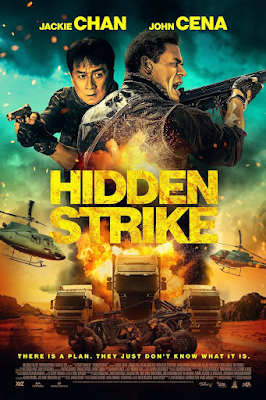The Fortress (2017)
Korean Title: 남한산성
Translation: South Han Mountain Fortress
Starring:
Lee Byung-hun, Kim Yoon-suk, Park Hae-il, Goh Soo, Song Young-chang, Park
Hee-soon, Lee Da-wit
Director:
Hwang Dong-hyuk
Action Director: Heo Myeong-haeng, Ryoo Sung-chul
As a kung fu movie fan, I’ve seen
numerous movies set during the Qing Dynasty (A.D. 1644 – 1911). Many of them
involve Han Chinese patriots and folk heroes fighting against the Qing (or
Manchu) “dogs” in a valiant (but ultimately unsuccessful) effort to restore the
Ming Dynasty (or at least put the Hans back in power). A few of them deal with
conflicts unique to that dynasty, like the infamous Taiping Rebellion. And
others—like most films involving Wong Fei-Hung—have the Qing Dynasty as a
backdrop, but don’t delve too much into the politics of the era (save the first
few Once Upon a Time in China films). The Fortress is interesting
because it tells a story from that period from a distinctly Korean
point-of-view.
The film is set in A.D. 1636, eight
years before the Manchurians will able to defeat the Ming Emperor and establish
rule over China. The Ming Dynasty—a failing surveillance state thanks to a
paranoid emperor and power-hungry eunuchs—is falling, while the Qings, composed
of the Manchurian Jurchen tribe, are winning. Now, the region known as
Manchuria borders on Korea (known then as the Joseon Kingdom) and both the Manchu
and Korean languages are part of the same linguistic family. So, there’s a
naturally feeling of brotherhood between them. The problem is that the Ming
Dynasty had helped out Joseon against Japanese invaders (probably pirates) at
some point and thus the royal family of Joseon pledged support to the Ming
throne. Now that the Qings are trying to conquer China, they are offended that
their “brothers” would support their enemies. So, a Qing army has come to the
Joseon kingdom in order to force capitulation by the king.
When the movie starts, the Qings have
already marched into the capital, forcing King Injo (Park Hae-il, of War of
the Arrows and Hansan: Rising Dragon) and his ministers to flee to
the south and take refuge in the fortress of Namhansanseong. A number of
civilians from villages located around the mountain have also sought refuge, so
there’s about 13,000 people holing up at the place. The problems are two-fold:
first, the Qings have surrounded the mountain and cut off all possible escape
(or entrance) routes from the place; second, it’s winter and this looks to be
an especially harsh one.
The bulk of the film involves the
interaction between King Injo and his ministers. Choi Myung-kil (Lee Byung-hun,
of G.I. Joe: Rise of the Cobra and I Saw the Devil) is the Minister
of the Interior, who is initially sent to try to negotiate peace terms with
General Yonggoldae (Heo Sung-tae of Dragon Ball: Son Goku Fights, Son Goku
Wins). The initial terms are for the king to renounce his support of the Ming
Dynasty and to deliver up the crown prince (whom we never see) as a hostage to
the Qing Emperor. Not only are the other ministers against this very idea, but
they accuse Minister Choi of being in cahoots with the Manchus. This is a
running theme throughout the film, that most of the king’s ministers exist to
do nothing but tell the king to kill the messenger. In any case, Choi is in
favor of peace at any costs, even it means becoming a vassal state to the Qing
Emperor.
Opposing him directly is the Prime
Minister (Song Young-chang, of Thirst and The Man from Nowhere)
and Kim Sang-hun (The Yellow Sea’s Kim Yoon-seok), the Minister of
Rites. To them, it is a question of national morality to not go back on their
support for the Ming throne, as it is a question of dignity for the country to
defend itself and be in bondage to nobody. While these two factions are going
back and forth, the elements and limited supplies are weighing down on the
soldiers’ morale. Enter a resourceful blacksmith named Nal-so (Goh Soo, Haunters
and The Front Line), who manages to “befriend” Minister Kim and give him
advice on how to take of the soldiers and maintain their weapons. Kim comes to
trust Nal-so—especially after his advice helps them repel several ambushes from
the Manchu soldiers. So as the winter drags on and things become dire, Kim
entrusts Nal-so with a special mission: sneak out of the fortress with a letter
to give to the reinforcement army camped out not too far away from the mountain…
Much of the film is less about the actual
skirmishes between the Joseon and Manchurian armies and more about the
political maneuverings between the two “factions” among the king’s ministers. The
inability of the king’s ministry to really unify themselves amidst a situation
that is quickly going from bad to worse quickly reflects on the soldiers’
morale, which then leads to discipline issues between the soldiers and the
highest brass of the military (i.e. the Prime Minister). The malfeasance of the
higher-ups is best exemplified by a series of scenes in which the Prime
Minister resorts to draconian measures to solve one problem, only to completely
render the sacrifice void in order to solve another. Case in point: the lack of
access to the grounds outside the fort leads the horses to go hungry, which
start collapsing en masse. Scared of losing their cavalry, the Prime
Minister orders that the straw roofs of the peasants’ houses and the soldiers’
sleeping bags (made of straw) be confiscated to feed the horses. But within a
few day, the army runs out of food and start butchering the horses for meat.
Thus, had the Minister not acted so rashly, the soldiers and peasants wouldn’t
be suffering from so much cold, given that the horses would’ve been slaughtered
(onscreen and in graphic detail) anyway.
The film is directed by Hwang Dong-hyuk,
who these days is best known for creating the international hit series Squid
Game. For the most part, he handles all of the drama as well as he can—not too
stoic, not too over-the-top during certain emotional moments. He also never
lets the story get too convoluted, given the epic scope of the story and the
possibility of introducing too many characters into the mix. The film looks
great, from the costumes to the photography. It is a bit grittier and more realistic
than many of the Chinese movies about the same subject, with a visual palate
that recalls The Warlords more than any Shaw film about the subject. Moreover,
I applaud his decision to the film the scenes with the Manchu characters in the
actual Manchu language, something we never saw in Chinese films, too.
My main problem with the movie is that
at 140 minutes—a common run time for too many Korean movies—the film feels
that length. I think we could have tightened up several of the scenes of the ministers
debating the morality of their options, or droning on about the authorship and
character of a capitulation letter to the Qing Emperor, or stuff like that. You
could made a few cuts to bring the run time down to smidgen past two hours and
it would have improved the final product immensely.
There are a few battle sequences—more like
minor skirmishes—in The Fortress, staged by Heo
Myeong-haeng (The Restless and The Good, the Bad and the Weird)
and Ryoo Sung-chul (Alienoid and The Battle: Roar to Victory).
Thankfully, these scenes, while short, are visibly shot and edited nicely, so
you can see what’s going on. We see Qing soldiers fighting with swords, spears
and kwan do (or assault blades—wielded by cavalry officers), plus the
occasional use of cannons. The Joseon soldiers fight mainly with swords and rifles.
There isn’t any room for length exchanges of sword swings and blocks, but the
battles are exciting. I just wish there were more of them: the action probably
accounts for less than 15 minutes in a 140-minute historical drama.
The Fortress was a huge success at home and was a critical darling, too, winning
all sorts of awards in different ceremonies. Kim Jee-yong won “Best Cinematography”
in three different awards ceremonies; legendary composer Ryuichi Sakamoto won “Best
Music” in two; Hwang Dong-hyuk won “Best Director” in two; and the movie won “Best
Film” in three. It’s certainly a good
movie, possibly a very good one. I just think it needed to be tighter
on the editing to reach great status.








